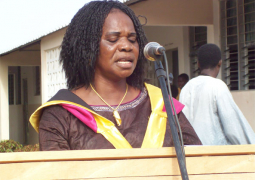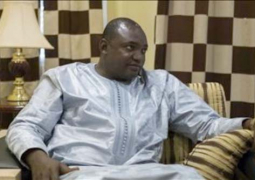
The Ministry of Youths and Sports and the National Sports Council in collaboration with the Voice of the Young, a child-led group under the auspices of the Child Protection Alliance (CPA) in The Gambia, recently commemorated Day of the Africa Child 2014 held at Nusrat Senior Secondary School grounds in Bundung-ka Kunda, in the Kanifng Municipality.
The Gambia government and its partners had joined the rest of the world to celebrate the first Children’s Bantaba in 2014, as well as to commemorate the Day of the African Child with the theme: “A child friendly, quality, free and compulsory education for all children in Africa.”
The event which is commemorated every year on the 16 June, was organized by the Voice of the Young, a child-led group under the auspices of Child Protection Alliance (CPA) in partnership with the National Youth Council.
In her statement, the permanent secretary at the Ministry of Youth and Sports, Nancy Nyang, said 16 June had always been set aside each year to reflect on the tragedy which happened in 1976 in Soweto, South Africa. This was when students protested for their right to education, and the brutal response of the Apartheid regime’s security agencies, which caused the death of many of them.
PS Nyang revealed that the theme for this year’s commemoration is: “A child friendly quality free and compulsory education for all the children in Africa”.
It is a process of attaining and fulfilling children’s rights to free quality and compulsory education in The Gambia for all, she said.
The DAC is an opportune moment to take stock of progress made and the outstanding challenges towards the full realization of that right for children in the Africa region, she added.
She thanked the government, partners and agencies for being willing to engage in these year‘s commemoration with activities and commitment.
She also stressed on child abuse, which she said was a menace in the society and would not be tolerated.
She further urged parents to be more supportive, and the society to be active in giving children the platform where they could speak their mind.
“The environment is already provided and other sectors are also prepared for the empowerment of children,” she stated.
The Director of Basic and Secondary Education at the Ministry of Education, Amicoleh Mbaye, said the 2004-2015 revised National Education Policy strives to ensure that the right to quality education for all was upheld and that education for all is achieved.
The MoBSE director informed the children that this commitment was clearly manifested by the presence of all partners that have a stake in the affairs of children.
“This is an indication that all of us are in this effort together, men and women, young and old, rich and poor. Today, being a day meant for reflection on the African child, calls for all of us to refocus our energies, our resources, our creativity, our passions, our dreams into a vision that can be seen and felt by all,” she said.
According to Mrs Mbaye, the celebration of the Day of the African Child gives them another opportunity to mobilize all their efforts towards the welfare of children, who constitute the backbone of the country’s future.
“We are gathered to commemorate the 1976 massacre of children in Soweto, who merely took to the streets to demand their right to racism-free education in the then Apartheid South Africa,” she stated.
“More than just a commemoration, the Day of the African Child seeks to draw the attention of all the actors involved in improving the condition of children on the continent, and to unite their efforts to combat the tribulations that plague the daily lives of children,’’ she went on.
The theme was uniquely important, because Africa’s development and its ability to be a force to be reckoned with, and its quest to be an economic super-power in a greatly competitive globalised world, could not happen in the absence of education.
She said her ministry continues to ensure that the right of children to a child-friendly, quality, free and compulsory education is realized within the shortest possible time, as clearly indicated in the revised Education Policy and strategic plan.
“We have developed effective oversight mechanisms to ensure that standards in our education system are respected. The newly-launched READ project is expected to serve as a gateway to fulfilling the theme of the 2014 Day of the African Child,” she noted.



